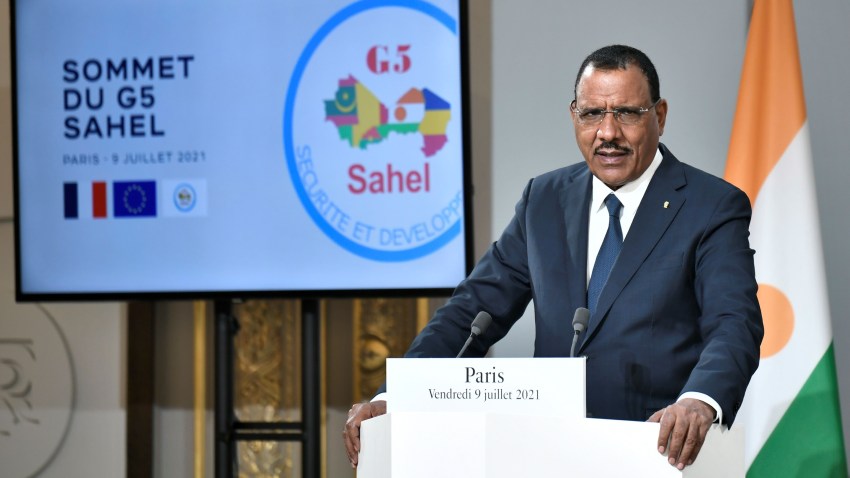Hello everyone. Today at WPR, we’re covering the coup in Niger and a controversial defense agreement between Bolivia and Iran.
But first, here’s our take on today’s top story in the news.
Iran-UAE relations: Iranian President Ebrahim Raisi has officially invited UAE President Mohammed bin Zayed Al Nahyan to visit Tehran in the near future, Reuters reports. The invitation comes amid a period of diplomatic reengagement between the two sides and throughout the region more broadly.
Our Take: Abu Dhabi and Tehran have been slowly thawing ties for a few years now, but attacks by Yemen’s Houthi rebels on Emirati territory early last year threatened to derail that process. Nevertheless, the UAE reappointed its ambassador to Iran last summer for the first time since downgrading relations in 2016, and Iran followed suit in April. This invitation confirms that both sides are committed to the détente.
That said, while the regional shift toward thawing relations across the Middle East is encouraging, the disputes and tensions that led to conflict in the first place have not actually been resolved, only frozen in place. The war in Yemen continues, and the strategic competitions between Iran and other Gulf states have not gone away.
There is also a risk that the diplomatic realignments taking place now could exacerbate other rivalries that had been obscured by shared interests in countering Iran, as in the case of Saudi Arabia and the UAE, whose competition for diplomatic and economic primacy in the Gulf has recently begun to intensify. A similar dynamic applies to the Abraham Accords, which normalized relations between Israel and the UAE—among other countries in the region—based in part on the logic of forging a coalition to contain Iran, not engage with it.
Still, it is certainly better for the region and the people living there if those rivalries are pursued peacefully, even as the jury remains out on whether these thawed relations will hold in the long term.
*****
You can read the rest of today’s News Wire, a curated selection of one must-read article from every region, here.

Last week’s coup in Niger caught much of the outside world by surprise, given the country’s image as a relatively stable outlier in a region beset by frequent upheaval.
But while foreign observers may have been stunned by President Mohamed Bazoum’s toppling, it did not come as a shock to many Nigeriens. Chris Olaoluwa Ògúnmọ́dẹdé explains why in today’s In-Depth article:
A defense agreement signed by Iran and Bolivia in late July, the details of which remain obscure, constitutes yet another step in Tehran’s effort to cement ties with leftist governments in Latin America.
The agreement also raised hackles in Argentina, Bolivia’s neighbor, where prosecutors have long blamed Iran and its Lebanese ally Hezbollah for the worst terrorist attack in the country’s history.
Columnist Frida Ghitis breaks down the deal—and its fallout:

Tunisian President Kais Saied has fired PM Najla Bouden Ramadhane, the first woman to hold that job in an Arab League nation. A statement from the presidential office did not give any reasons for the dismissal.
Democratic backsliding in Tunisia has accelerated since Saied consolidated power in July 2021, and one of the rights most under threat is gender equality. As Sarah Yerkes wrote in December, Saied has paid lip service to gender equality—as in the appointment of Ramadhane—while simultaneously undermining it.
Saied Is Bad News for Women’s Rights in Tunisia
Dec. 12, 2022 | Tunisian President Kais Saied is giving lip service to gender equality, while simultaneously chipping away at democracy and women’s rights. Read more.
*****
The U.K. has announced a clean energy deal with Zambia that will see the British government and private sector invest in Zambia’s mining, minerals and renewable energy sectors. Zambia is a major copper producer and has deposits of several other critical minerals necessary for the green transition.
The shift to renewable energies that many Western countries have prioritized relies heavily on the extraction of minerals and metals that are primarily found in Global South countries. As a result, as Teresa Kramarz wrote last year, the green transition risks reproducing the damage historically associated with the mining sector.
The Green Energy Transition Has an Extractivism Problem
Nov. 15, 2022 | Accessing the critical minerals essential for developing low-carbon energy options brings us to the dark side of the green transition. Read more.
That’s all for today’s Daily Review. Coming up, we’re covering the potential impact of UFOs on international politics and Algeria-China relations.
Have a great day,
Jakob Cansler
More From WPR
- Antonio Giustozzi on jihadist groups in Afghanistan.
- Alexander Clarkson on security in West Africa.
- Charli Carpenter on Ukraine’s male-only travel ban.
- Chido Mutangadura on human rights in Burundi.

